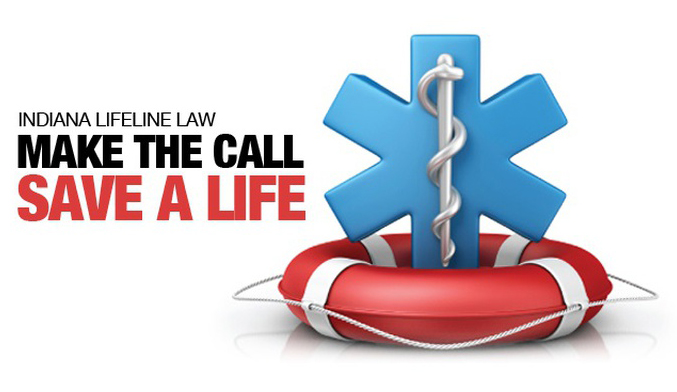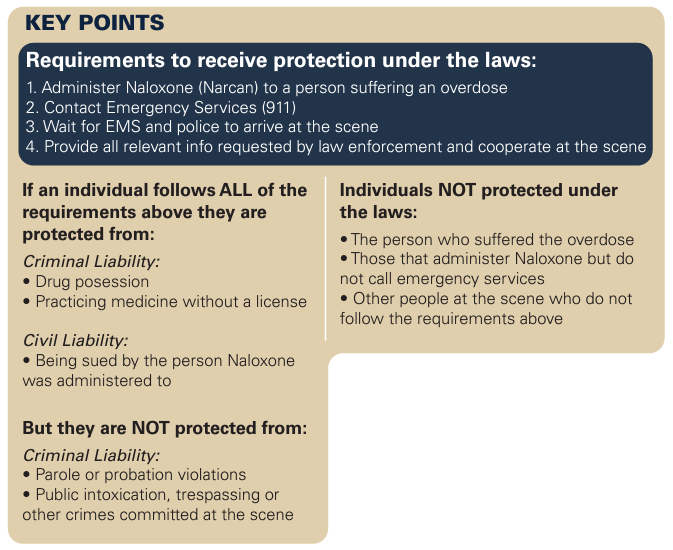Indiana Laws
While alcohol under 30 proof is allowed in residence halls for those age 21 and over, Indiana Tech is a tobacco/smoke free campus. Follow the links provided to learn more regarding the alcohol and tobacco policies.

Indiana Lifeline Law
“The Lifeline Law provides immunity for the crimes of public intoxication, minor possession, minor consumption, and minor transport to persons who reveal themselves to law enforcement while seeking medical assistance for a person suffering from an alcohol-related health emergency.”
To learn more visit indianalifeline.org.
Aaron’s Law & Overdose Good Samaritan Law
“Across the state of Indiana, an individual administering Naloxone (Narcan) to a person who has overdosed is protected under the law so long as they “act in good faith” do not display “gross negligence or willful misconduct,” and they attempt to summon EMS.”
To learn more, visit overdoselifeline.org/aarons-law

Underage Drinking
The legal drinking age in Indiana is 21. If you are younger than 21 you can be charged with a crime for drinking, holding, or even being in the same car as alcohol. If you are 21 or over, you can be charged with a crime for selling, buying, or giving alcohol to a minor.
Illegal possession (IC 7.1-5-7-7)
It’s illegal for a minor to possess or consume alcohol. This includes transporting alcohol in a car on a public road without the driver’s parent in the car, regardless of whether the alcohol belongs to someone else in the car or is unopened.
Furnishing alcohol to a minor (IC 7.1-5-7-8)
It’s illegal to sell or give alcohol to minors. The charge is worse if you have broken an alcohol law previously, and it becomes a felony if the alcohol you provide causes anyone to get injured or die.
It’s also illegal to knowingly provide a place for minors to drink alcohol, whether or not you were the one to provide the alcohol.
Aiding unlawful possession (IC 7.1-5-7-15)
It’s illegal for someone 21 or older to help or encourage someone underage to obtain or consume alcohol.
False statements of age (IC 7.1-5-7-1)
If you are a minor and you lie about your age or present false evidence that you are not a minor (such as using a fake ID or someone else’s ID), the court may fine you up to $500. Using a fake ID can also result in a license suspension for up to 12 months.
Furnishing false evidence or identification (IC 7.1-5-7-2)
It’s illegal to give or sell a fake ID to a minor, or to let them use your valid ID in a fraudulent way.
Possession of false identity (IC 7.1-5-7-3)
It’s illegal to carry a fake ID with the intent to use it, even if you haven’t used it yet.
Drinking in Public
Even if you are old enough to legally drink alcohol, you can still get arrested or in trouble for being alarming, disruptive, or dangerous in a public area.
Public intoxication (IC 7.1-5-1-3)
It’s illegal to be drunk in a public place if your behavior is annoying, alarming, disruptive, or dangerous.
Intoxication upon common carrier (IC 7.1-5-1-6)
It’s illegal to be drunk or high on public transportation, or around bus stations, airports, etc.
It is illegal everywhere in the United States to operate a motor vehicle while under the influence or intoxicated. Be mindful of how you are going or leaving a place after drinking.
Open alcoholic beverage container during operation of motor vehicle (IC 9-30-15-3)
It’s illegal to drive with an alcohol container that is open or had the seal broken, unless the container is locked out of reach, in a separate passenger compartment (for example, the back of a limo), in the trunk, or behind the last seat if there is no trunk.
Consumption of alcohol while operating a motor vehicle (IC 9-30-15-4)
It’s illegal to knowingly consume any alcohol while you’re driving.
Operating a vehicle while intoxicated (IC 9-30-5)
- A driver whose alcohol concentration is greater than or equal to .08 grams and less than .15 grams of alcohol per 100 milliliters of blood, or 210 liters of breath, is charged with a Class C Misdemeanor.
- A driver whose alcohol concentration is greater than or equal to .15 grams per 100 milliliters of blood is charged with a Class A Misdemeanor, punishable by up to one year in prison and up to a $5,000 fine.
- A driver who, while driving under the influence of alcohol or drugs, endangers a person (including him or herself), is charged with a Class A Misdemeanor, punishable by up to one year in prison and up to a $5,000 fine.
- A second violation is a Class D Felony, if there has been a previous conviction within the last five years. Class D Felonies are punishable by a fine of up to $10,000 and three years in prison.
- A person who causes serious bodily injury to another person while operating a motor vehicle with an alcohol concentration of .08 grams or more than 100 milliliters of blood or 210 liters of breath commits a Class D Felony. If there has been a previous, unrelated conviction within the past five years for operating a vehicle while intoxicated, it is a Class C Felony, punishable by up to 8 years in prison and up to $10,000 in fines. It is a separate offense for each person injured by the impaired driver.
- A person who kills another person while operating a motor vehicle with an alcohol concentration of .08 or more commits a Class C Felony, punishable by up to eight years in prison and up to $10,000 in fines. If the driver has a previous conviction within the last five years, the penalty is a Class B Felony, punishable by up to 20 years in prison and up to $10,000 in fines. It is a separate offense for each person killed by the impaired driver.
Hosting Parties
When hosting a party where there will be alcohol or other substances involved, be mindful that you are liable for anything that goes wrong, including injuries, alcohol poisoning, and other incidents.
Civil liability for damages (IC 7.1-5-10-15.5)
You can be held liable if you give alcohol to someone who you knew was already intoxicated and that person’s intoxication later leads to damages, injuries, or death.
Social host law (IC 7.1-5-7-8)
It’s illegal to knowingly provide a place for minors to drink alcohol, whether or not you were the one to provide the alcohol.
Sale to minors (IC 7.1-5-7-8)
It’s illegal to sell or give alcohol to minors. The charge is worse if you have broken an alcohol law previously, and it becomes a felony if the alcohol you provide causes anyone to get injured or die.
Sale without permit (IC 7.1-5-10-5)
It’s illegal to sell alcohol without a permit. This includes charging cover fees at parties, accepting donations in exchange for alcohol, charging for keg cups, hosting a cash bar, or otherwise charging for drinks. Temporary beer/wine permits are available through the Indiana Alcohol & Tobacco Commission for $50.
Unauthorized dealings (IC 7.1-5-10-3)
It’s illegal to give away, furnish, sell, barter, or provide an alcohol beverage to a person other than an invited guest or member of his or her family. Guests are individually invited and do not include open house party attendees. You can obtain a temporary beer/wine permit for $50.
Sale to intoxicated person prohibited (IC 7.1-5-10-15)
It is unlawful to sell or give away an alcoholic beverage to someone you know to be intoxicated.
Possession of keg without identification marker or with altered marker (IC 7.1-3-6.5-6)
It’s illegal to possess a beer keg without a valid identification marker.
Visiting or maintaining a common nuisance (IC 35-48-4-13)
It’s illegal to knowingly visit a building or vehicle that houses illegal drug activity. It’s a felony to maintain a building or vehicle that is used in the manufacture, storage, sale, delivery, or financing of illegal drugs or paraphernalia.
Cannabis Laws
Cannabis, or marijuana, pot, or weed, is illegal in Indiana and prohibited by federal law. It is against the law to grow, buy, sell, or carry cannabis products that contain more than 0.3% THC by weight. There is no medical use waiver for cannabis in Indiana and you cannot legally bring it into Indiana from another state – even with a prescription.
Possession of marijuana, hash oil, hashish, or salvia (IC 35-48-4-11)
It’s illegal to possess or grow marijuana. If you know marijuana is growing on your premises and don’t destroy it, it counts as possession.
Dealing in marijuana, hash oil, hashish, or salvia (IC 35-48-4-10)
It’s illegal to knowingly be involved in the production, sale, or delivery of marijuana or synthetic marijuana.
Possession of paraphernalia (IC 35-48-4-8.3)
It’s illegal to possess drug paraphernalia (e.g. materials or devices used to put controlled drugs in the body, test the strength or purity of drugs, or enhance the effects of drugs). The charges get worse if the paraphernalia has been used (e.g. drug residue) and if you have prior drug offenses.
Definition of hemp products (IC 15-15-13-6.5)
Hemp products like CBD oil are legal in Indiana. A hemp product is a product derived from the Cannabis sativa L. plant that contains less than 0.3% THC.
Definition of smokable hemp (IC 35-48-1-26.6)
Smokable hemp means a hemp product that allows THC to be introduced into the body by inhalation of smoke. Smokable hemp must also containing less than 0.3% THC by dry weight.
Controlled Substances
Prescription drugs are controlled substances meaning there are restrictions with how they can be used.
Possession of cocaine or narcotic drug (IC 35-48-4-6)
It’s a felony to possess cocaine or narcotic drugs, including methamphetamine, Schedule I (Ecstasy, GHB, LSD) or Schedule II (Ritalin, Concerta, Adderall, Oxycodone) prescription drugs without a prescription. Charges get worse if the amount is over 5 grams, if you have a prior drug conviction, or if you possess the drugs in or near a school, public park, etc.
Dealing in cocaine or narcotic drug (IC 35-48-4-1)
It’s a felony to knowingly be involved in the production, sale, or delivery of cocaine or narcotic drugs. Charges get worse if the amount is over 5 grams, or if you deal the drugs in or near a school, public park, etc.
Dealing in a schedule I, II, or III controlled substance (IC 35-48-4-2)
It’s a felony to knowingly be involved in the production, sale, or delivery of Schedule I, II, or III drugs (e.g. Vicodin, Ritalin, Adderall, Concerta, and street drugs other than Marijuana). Charges are worse if the recipient is under 18, or if you deal the drugs in or near a school, public park, etc.
Dealing in a schedule IV controlled substance (IC 35-48-4-2)
It’s a felony to knowingly be involved in the production, sale, or delivery of Schedule I, II, or III drugs (e.g. Vicodin, Ritalin, Adderall, Concerta, and street drugs other than Marijuana). Charges are worse if the recipient is under 18, or if you deal the drugs in or near a school, public park, etc.
Dealing in a schedule V controlled substance (IC 35-48-4-4)
It’s a felony to knowingly be involved in the production, sale, or delivery of Schedule V drugs (certain controlled prescription drugs). Charges are worse if the recipient is under 18, or if you deal the drugs in or near a school, public park, etc.
Dealing in methamphetamine (IC 35-48-4-1.1)
It’s a felony to knowingly be involved in the production, sale, or delivery of methamphetamine. Charges get worse if the amount is over 5 grams, or if you deal the drugs in or near a school, public park, etc.
Inhaling toxic vapors (IC 35-46-6-2)
It’s illegal to get high on model glue and a variety of other chemicals that release toxic vapors.